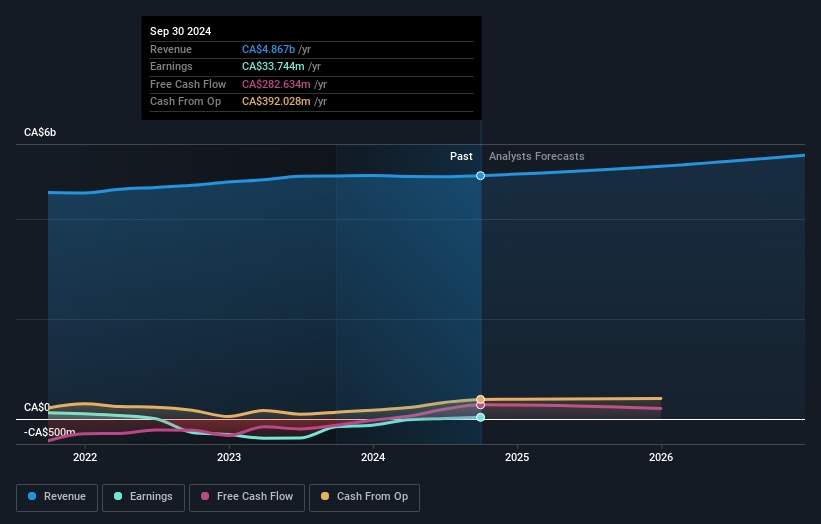A CA$207m drop in the market cap of Maple Leaf Foods Inc. (TSE:MFI) is not what insiders like to see after purchasing shares recently

Key Insights
- Insiders appear to have a vested interest in Maple Leaf Foods' growth, as seen by their sizeable ownership
- A total of 2 investors have a majority stake in the company with 52% ownership
- Insiders have been buying lately
Every investor in Maple Leaf Foods Inc. (TSE:MFI) should be aware of the most powerful shareholder groups. And the group that holds the biggest piece of the pie are individual insiders with 40% ownership. That is, the group stands to benefit the most if the stock rises (or lose the most if there is a downturn).
Notably, insiders have bought shares recently. Their expectations, however, were not satisfied, as the market cap dropped to CA$2.6b over the past week.
In the chart below, we zoom in on the different ownership groups of Maple Leaf Foods.
Check out our latest analysis for Maple Leaf Foods

What Does The Institutional Ownership Tell Us About Maple Leaf Foods?
Many institutions measure their performance against an index that approximates the local market. So they usually pay more attention to companies that are included in major indices.
Maple Leaf Foods already has institutions on the share registry. Indeed, they own a respectable stake in the company. This suggests some credibility amongst professional investors. But we can't rely on that fact alone since institutions make bad investments sometimes, just like everyone does. It is not uncommon to see a big share price drop if two large institutional investors try to sell out of a stock at the same time. So it is worth checking the past earnings trajectory of Maple Leaf Foods, (below). Of course, keep in mind that there are other factors to consider, too.

Hedge funds don't have many shares in Maple Leaf Foods. Because actions speak louder than words, we consider it a good sign when insiders own a significant stake in a company. In Maple Leaf Foods' case, its Top Key Executive, Michael McCain, is the largest shareholder, holding 40% of shares outstanding. Meanwhile, the second and third largest shareholders, hold 13% and 2.4%, of the shares outstanding, respectively.
After doing some more digging, we found that the top 2 shareholders collectively control more than half of the company's shares, implying that they have considerable power to influence the company's decisions.
While it makes sense to study institutional ownership data for a company, it also makes sense to study analyst sentiments to know which way the wind is blowing. There are a reasonable number of analysts covering the stock, so it might be useful to find out their aggregate view on the future.
Insider Ownership Of Maple Leaf Foods
While the precise definition of an insider can be subjective, almost everyone considers board members to be insiders. The company management answer to the board and the latter should represent the interests of shareholders. Notably, sometimes top-level managers are on the board themselves.
Insider ownership is positive when it signals leadership are thinking like the true owners of the company. However, high insider ownership can also give immense power to a small group within the company. This can be negative in some circumstances.
It seems insiders own a significant proportion of Maple Leaf Foods Inc.. It has a market capitalization of just CA$2.6b, and insiders have CA$1.0b worth of shares in their own names. That's quite significant. Most would be pleased to see the board is investing alongside them. You may wish to access this free chart showing recent trading by insiders.
General Public Ownership
With a 33% ownership, the general public, mostly comprising of individual investors, have some degree of sway over Maple Leaf Foods. While this size of ownership may not be enough to sway a policy decision in their favour, they can still make a collective impact on company policies.
Next Steps:
I find it very interesting to look at who exactly owns a company. But to truly gain insight, we need to consider other information, too. Be aware that Maple Leaf Foods is showing 3 warning signs in our investment analysis , and 2 of those are concerning...
If you are like me, you may want to think about whether this company will grow or shrink. Luckily, you can check this free report showing analyst forecasts for its future.
NB: Figures in this article are calculated using data from the last twelve months, which refer to the 12-month period ending on the last date of the month the financial statement is dated. This may not be consistent with full year annual report figures.
New: Manage All Your Stock Portfolios in One Place
We've created the ultimate portfolio companion for stock investors, and it's free.
• Connect an unlimited number of Portfolios and see your total in one currency
• Be alerted to new Warning Signs or Risks via email or mobile
• Track the Fair Value of your stocks
Have feedback on this article? Concerned about the content? Get in touch with us directly. Alternatively, email editorial-team (at) simplywallst.com.
This article by Simply Wall St is general in nature. We provide commentary based on historical data and analyst forecasts only using an unbiased methodology and our articles are not intended to be financial advice. It does not constitute a recommendation to buy or sell any stock, and does not take account of your objectives, or your financial situation. We aim to bring you long-term focused analysis driven by fundamental data. Note that our analysis may not factor in the latest price-sensitive company announcements or qualitative material. Simply Wall St has no position in any stocks mentioned.
About TSX:MFI
Maple Leaf Foods
Produces food products in Canada, the United States, Japan, China, and internationally.
Reasonable growth potential average dividend payer.
Similar Companies
Market Insights
Community Narratives



